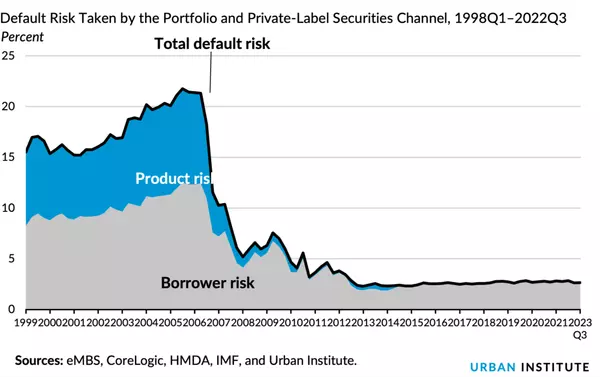
US Mortgage Credit Availability Increased in Late-Q1
In late Q1 of 2023, the US mortgage credit availability increased, signaling a positive outlook for the housing market. This increase in credit availability means that lenders are more willing to lend money to potential homebuyers, which can make it easier for people to obtain a mortgage and purchase a home. There are several factors that have contributed to the increase in mortgage credit availability. One of the main reasons is the overall strength of the US economy. With low unemployment rates and a robust job market, more people are able to afford homeownership, and lenders are more confident in their ability to repay their loans. Another factor that has contributed to the increase in credit availability is the historically low interest rates. The Federal Reserve has kept interest rates low to help stimulate economic growth, which has made borrowing money more affordable for consumers. As a result, lenders are more willing to take on the risk of lending money to homebuyers. In addition, the government has implemented policies to help increase access to credit. For example, the Federal Housing Administration (FHA) has lowered its mortgage insurance premiums, making it more affordable for homebuyers to obtain an FHA-insured loan. Additionally, Fannie Mae and Freddie Mac have increased their loan limits, allowing more borrowers to qualify for conforming loans. The increase in mortgage credit availability is good news for both homebuyers and the housing market. Homebuyers now have more options when it comes to obtaining a mortgage, which can help them find a loan that meets their needs and budget. This can also lead to more home sales, which can help boost the overall health of the housing market. However, it's important to note that just because credit availability has increased, it doesn't mean that everyone will be able to obtain a mortgage. Lenders still have strict lending standards and borrowers will need to meet certain criteria to qualify for a loan. This includes having a good credit score, a stable income, and a reasonable amount of debt. Additionally, borrowers should be cautious when taking on debt and should only borrow what they can afford to repay. While it may be tempting to take advantage of the increased credit availability, borrowers should remember that a mortgage is a long-term commitment and they will be responsible for making payments for many years. In conclusion, the increase in mortgage credit availability in late Q1 of 2023 is a positive sign for the housing market and the overall economy. With more options for obtaining a mortgage, homebuyers may find it easier to achieve their dream of homeownership. However, borrowers should still be careful when taking on debt and should only borrow what they can afford to repay.

Is There Really a New, Unfair Mortgage Tax on Those With High Credit?
Is There Really a New, Unfair Mortgage Tax on Those With High Credit? Weekly Newsletter Seemingly overnight, the internet is awash with news regarding a "new," unfair tax on mortgage borrowers with higher credit scores. Some have gone so far as to suggest that someone could intentionally lower their credit score in order to get a better deal. Before you stop paying your bills in the hope of cashing in, let's separate fact from fiction. First and most importantly, you will absolutely NOT get a better deal on a mortgage rate if your credit score is lower, even if your nephew just texted you a screenshot of a news headline saying "620 FICO SCORE GETS A 1.75% FEE DISCOUNT" and "740 FICO SCORE PAYS 1% FEE." So why would your nephew make such a claim? This all has to do with changes to Loan Level Price Adjustments (LLPAs) imposed by Fannie Mae and Freddie Mac (the "agencies"), the two entities that guaranty a vast majority of new mortgages. LLPAs are based on loan features such as your credit score and the loan-to-value ratio among other things. They've been changed several times over the years and a fairly substantial change was announced in January of this year. Wait... This news is from JANUARY?! Why are people talking about it now? Yes, in fact, we already told you about it. People are confused because they don't understand how "delivery dates" work when it comes to Fannie and Freddie. Changes that impact fees and guidelines are almost always implemented based on the date the loan in question is "delivered" to Fannie/Freddie. "Delivery," in this context, typically occurs a matter of weeks AFTER the loan is closed, although it can be more than a month. Now consider that a closed loan has often been quoted and locked for more than 3 weeks--call it a month to be safe. Since these changes go into effect on loans delivered on or after May 1st, 2023, lenders began to implement them weeks ago. Many lenders implemented them months ago--especially for loans that are locked for longer periods of time. So low credit borrowers are already getting a discount while high credit borrowers pay more? Not exactly, and this is where the confusion comes in. Also, from here on out, please note that there is no opinion offered here as to whether this is good/bad/etc. The only goal is to clear up confusion and offer facts. The fact of matter is that LLPAs are indeed changing in a way that improves costs for those with lower credit scores and increases costs for those with higher credit scores (in many cases, anyway). But people are confusing the CHANGE for the ACTUAL cost. So a low credit borrower isn't paying less than a high credit borrower? The gap between what they pay is just smaller than it was? YES! Again, all value judgements and political commentary aside, the change amounts to a tweak of an existing fee structure in favor of those with lower credit scores and at the expense of those with higher credit scores, but there's no scenario where someone with lower credit will have a lower fee. In other words, don't go skipping those credit card payments in the hopes of getting a lower rate. How about some color-coded charts/tables? I thought you'd never ask. Let's start with the changes that have everyone so upset. The following tables shows the DIFFERENCES (in % of loan balance) in LLPAs before and after the change. RED = rising costs. GREEN = falling costs. If you only saw this chart, you could be forgiven for thinking someone with a 640 credit score was paying less than someone with a 740, but again, these are just the changes. Now let's look at a table with OUTRIGHT LLPAs for the same matrix of credit scores and loan-to-value ratios. This is the NEW structure, after the implementation of the change. As you can now plainly see, if you have a score of 640, you'll be paying significantly more than if you had a 740. Using an 80% loan-to-value ratio as an example, your LLPA at 640 is 2.25% versus 0.875% for a 740 score. That's a difference of 1.375%, or just over $4000 on a $300k mortgage. This is almost HALF the previous difference, and that's certainly a big change. Yes, it's a big change, so why is the government doing this to people with higher credit?! Fannie and Freddie technically have a "mission" to promote affordable home ownership. Here is the statement on the topic by their regulator, the FHFA: FHFA Announces Updates to the Enterprises’ Single-Family Pricing Framework. Note in the first two tables that there is more of an improvement for the lower FICO rows on PURCHASES (i.e. home ownership vs refis). Any other misconstrued news I need to know about? Yes, actually. While not as viral as the LLPA stuff, there has been a fair amount of press on a new 40yr FHA mortgage. THERE IS NO NEW 40yr FHA LOAN! Lenders who collect payments on FHA loans have a new option to offer loan modifications with terms of 40 years to borrowers who are unable to pay their existing FHA loans. Don't you usually talk about financial markets in these newsletters? Indeed! But since we've taken a fair amount of space on more interesting stuff above, we can keep the market recap fairly short. Rates moved higher to start the week as economic data was strong on Monday morning. There were several other examples of reactions to economic data at home and abroad as the week continued, but all of them played out in a sideways range that continues to wait on the first two weeks of May for the most relevant input.

Charlotte Community Heroes
Charlotte Community Heroes Eligible Borrowers: Those who are employed as Law Enforcement Officers,Firefighters, and other First Responders, or School Teachers, with household incomes between 80.01% - 110% of the Area Median Income (AMI) Definitions: Law Enforcement Officers - must provide proof that you are an active full-time employee of a law enforcement agency of the federal, state or general local government or Indian tribal government. The Officer must be sworn to uphold the law, and make arrest, or in other authorized enforcement activities for violations of federal, state, tribal, county, township or municipal laws. Firefighters - must provide proof that you are an active full-time employee that is licensed, certified or authorized firefighter of the Fire Department of the federal, state or general local government, or an Indian tribal government. Other First Responders - Emergency Medical Technicians (EMT), MEDIC Mecklenburg Emergency Medical Agency,) etc. - must provide proof that you are an active full-time employee that is licensed, certified or authorized EMT of a medical emergency medical services responder. The medical services responder can be either a private sector provider or a unit of the federal, state or local government, or an Indian tribal government. School Teachers - must provide proof that you are an active full-time pre-kindergarten - 12th grade teacher of a state-accredited public or Charter school that provides direct educational services to students in these grade levels. Required proof of the above listed employment:Paystub - paystub listing the organization at which you work along with the title of your position· Designation Certificate - a copy of your certificate or license indicating you are a certified law enforcement officer, firefighter, EMT, or teacher as defined above. NOTE: The City of Charlotte/HouseCharlotte reserves the right to request additional documentation or formal verification of employment confirming that customer’s employment meets definitions above. Additional documentation is required to determine HouseCharlotte program eligibility. Want to chat about our programs? click here: LET'S TALK 980-745-6506
Categories
- All Blogs (56)
- Buying a Home in Charlotte, NC (2)
- Charlotte Residential Real Estate News (3)
- Finding A Home (4)
- Lifestyle and Community (1)
- Living In Charlotte NC (24)
- Mortgage Loans (7)
- Neighborhood Guides (3)
- Real Estate Market Trends (2)
- Relocation and Moving to Charlotte (1)
- Things to do in Charlotte NC (3)
- Veterans (3)
Recent Posts










